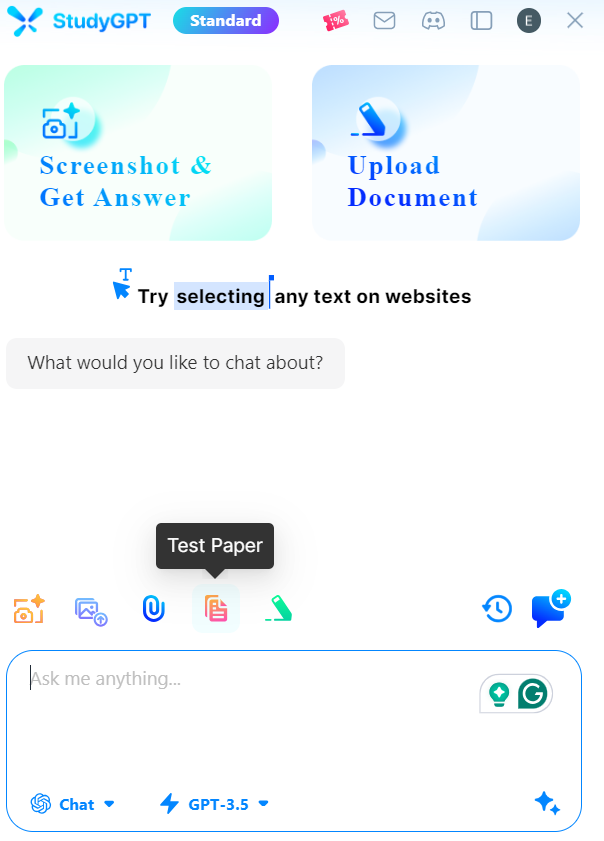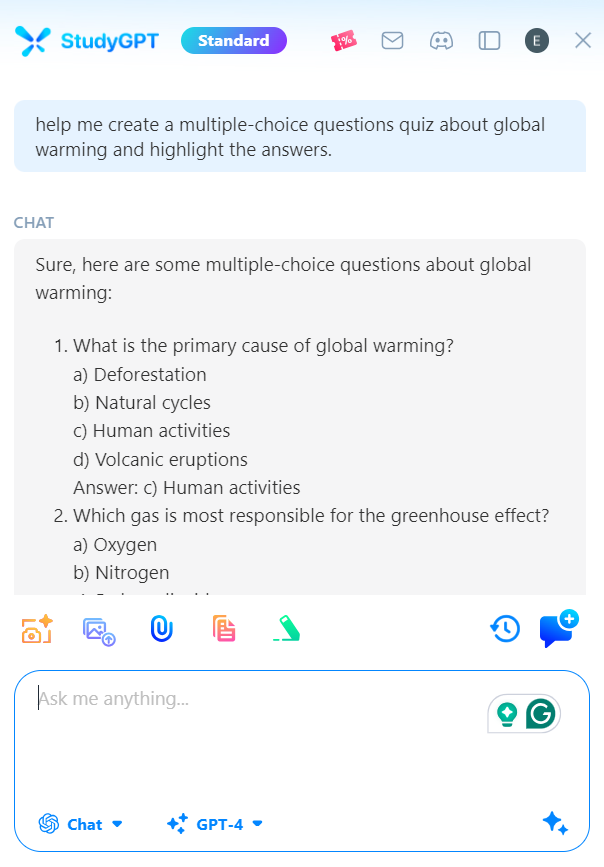Introduction:
Nowadays AI-powered tools are reshaping the way we live and making things more efficient compared with the last decade for example, it's up to us to get adapted to it or be left behind, and it wouldn't be different with education. Education has been facing a significant advancement. In this article, you will understand the revolutionized way that students found to enhance their learning experience and comprehend how you can use StudyGPT to solve multiple-choice questions.
We all went through some multiple-choice questions exams back in school or college, but have you ever thought about the downside of multiple-choice exams? It's obviously a common assessment tool used by teachers as a way of testing your knowledge during classes, but it can also be a challenge as it demands a lot of critical thinking and somehow strategic decision-making skills. Most of the time multiple choice question exams seem to be easier than the traditional handwriting exam, but students can easily struggle to master these skills and it can be way more than just memorizing the content taught by your teacher.
What is the solution? How can AI help me?
AI technology such as StudyGPT has created methodologies to help you cease your questions and solve questions within seconds. StudyGPT can even help you create multiple-choice question tests to help you practice whatever you need to review or any knowledge you need to review.

With AI-powered features and GPT-4 available for users, you can upload your PDF or Word file into our Test Paper feature and let StudyGPT create a multiple-choice questions exam that you can use to review, or if you don't have a specific file, you can also chat with StudyGPT and ask GPT to create some multiple-choice questions and underline the answers. You just need to choose a topic and let StudyGPT make the magic happen!

Choosing the right AI assistant
Choosing the correct AI technology to help with multiple-choice questions (MCQs) is critical for various reasons:
1. Accuracy: The right AI tool provides accurate and dependable results. High accuracy is critical, particularly in educational settings or professional exams where accurate answers affect grades, certification, or career chances.
2. Efficiency: A successful AI tool can quickly process and analyze inquiries, allowing for timely assistance. This efficiency is beneficial for both studying and taking exams, allowing users to save time and focus on other things.
3. Understanding Context: AI technologies vary in their ability to grasp and interpret query context. The suitable tool will better understand the subtleties of the topic and its options, resulting in more appropriate and contextually relevant responses.
4. Adaptability: A suitable AI tool can adapt to a variety of subjects and query types. This adaptability guarantees that the tool may be utilized across multiple fields and question types, making it a useful help.
5. Learning Support: The right AI technology may present students with explanations and learning tools, allowing them to comprehend why some responses are correct or erroneous. This educational support is critical to optimal learning and knowledge retention.
6. Bias & Fairness: The ideal AI tool will be developed to reduce biases, resulting in fair and unbiased help. This is especially crucial in educational and professional environments, where impartiality is essential.
7. Security and Privacy: Ensuring that the AI tool meets privacy and security standards is critical for protecting user data and maintaining confidentiality, particularly in academic and professional settings.
8. Cost-effectiveness: The ideal instrument strikes an appropriate balance between cost and functionality. It is critical to select a tool that provides the necessary capabilities while remaining cost-effective.
By carefully choosing an AI tool that satisfies these requirements, users can improve their performance on multiple-choice questions and obtain a better comprehension of the subject.

Extra AI tools to help you with multiple-choice questions:
1. College Tools: An AI-driven tool that extends its functionalities to MCQs across all websites, thereby providing broad coverage. Seamlessly integrating with various Learning Management Systems, it delivers accurate, AI-generated solutions to MCQs.
2. Wolfram Alpha: Boasts a vast array of algorithms and a considerable data set to provide reliable answers to questions across a wide range of subjects. Particularly MCQs, offer detailed solutions and allow students to delve deeper into the problems, enhancing understanding and mastery of the material.
3. Socratic by Google: A mobile application that offers comprehensive assistance to high school and university students. With support for various subjects and formats, including MCQs, it provides a versatile platform for learners. The user-friendly interface allows students to photograph a question, and the AI assistant promptly returns explanations, definitions, and step-by-step solutions.
In conclusion, using StudyGPT for multiple-choice questions can improve learning, efficiency, and accuracy in a variety of subjects. StudyGPT can provide dependable answers, fast assistance, and important educational support, making it an essential resource for both students and professionals alike. Its ability to grasp context, adapt to varied topics, and provide unbiased, safe, and user-friendly experiences highlights its significance. By carefully choosing an AI tool that corresponds with individual goals and standards, users can optimize their potential, increase knowledge retention, and achieve superior outcomes in their academic and professional efforts.